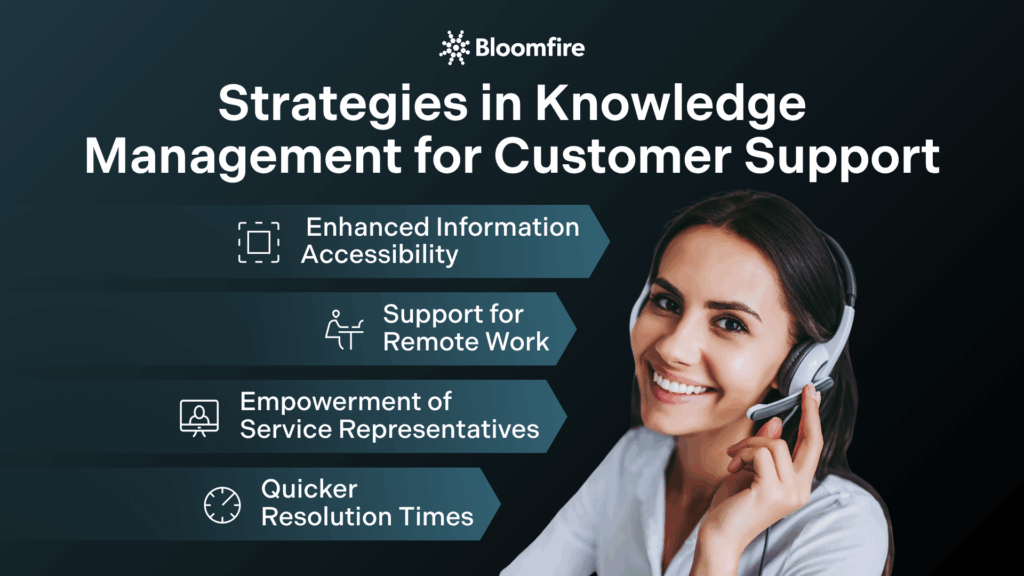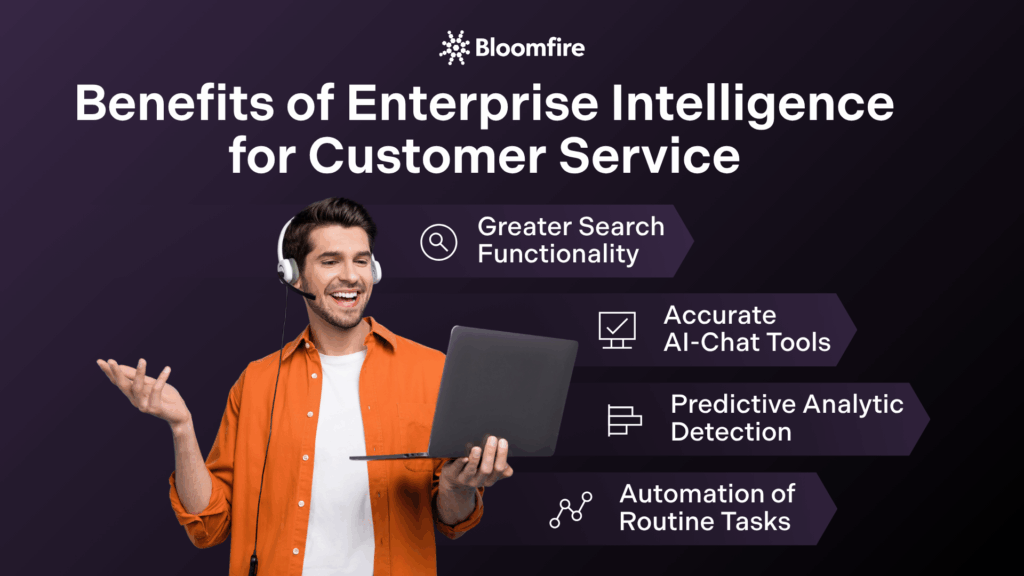The Importance of Knowledge Management in Customer Service

In the current digital age, customer expectations for rapid, effective, and immediate service are at an all-time high. Despite this need for speed, maintaining the quality of customer service remains paramount, as even a single negative experience can lead to customer attrition and frustration.
The solution to this problem lies in a customer service knowledge management platform like Bloomfire. Knowledge management is crucial in customer service because it provides timely, centralized access to accurate information, enabling support agents to resolve issues efficiently while delivering reliable, consistent, and memorable experiences.
By implementing a knowledge management system, customer service teams evolve by fostering efficiency, empowering agents, ensuring consistency, and supporting both self-service and business growth.
Optimizing Customer Service through Knowledge Management
A purpose-built knowledge management platform is the cornerstone for improving customer service. Such a system centralizes and organizes critical information, enabling customer service representatives to quickly access accurate answers to customer queries. This accelerates response times and ensures consistent, reliable information.
4 Key Strategies in Knowledge Management for Customer Support
A purpose-built knowledge management platform is the cornerstone for improving customer service. Such a system centralizes and organizes critical information, enabling customer service representatives to quickly access accurate answers to customer queries. This accelerates response times and ensures consistent, reliable information.
4 Key Strategies in Knowledge Management for Customer Support

By centralizing and streamlining access to information, companies can enhance the efficiency, accuracy, and quality of their customer service with knowledge management systems. There are specific strategies where knowledge management plays a pivotal role in enhancing customer service quality:
1. Enhanced Information Accessibility
Knowledge management dismantles information silos, allowing seamless information flow across different departments. This integration ensures that all service agents, regardless of department or location, have uniform access to the necessary information, streamlining the customer support process. This directly translates to improved customer service by ensuring that all customers receive accurate and consistent information regardless of whom they speak with.
2. Support for Remote Work
Providing consistent customer support remotely has become essential in today’s shifting work environment. Knowledge management systems facilitate this by offering remote access to comprehensive databases, enabling agents to deliver high-quality customer service from any location. This capability ensures that the quality of customer service remains high, even if the interaction is not face-to-face, thereby maintaining customer satisfaction and trust.
3. Empowerment of Service Representatives
Access to a centralized knowledge base allows customer service agents to efficiently resolve queries independently. This reduces escalations and hold times, directly enhancing customer service. Agents empowered with knowledge management can offer more personalized interactions, significantly improving the customer experience and encouraging customer loyalty.
4. Quicker Resolution Times
Integrating knowledge management systems in customer support operations minimizes the time customers spend waiting for responses. Customer service agents save about two hours per week by minimizing time spent searching for information, allowing them to assist customers faster. By providing immediate access to relevant information, these systems ensure that customer inquiries are resolved promptly, enhancing overall customer satisfaction. Rapid response times are crucial to maintaining customer happiness and loyalty, making this a critical factor in improving customer service
3 Advantages of Knowledge Management for Customers
Knowledge management doesn’t just improve the work experience for employees and companies; it also enhances the overall performance of organizations. Customer service knowledge management transcends external efficiencies, directly elevating the customer experience. Customers will have a much better experience when contacting customer support because of the knowledge management systems put in place:
1. Self-Service Optimization
When it comes to customer support, most customers actually favor resolving their issues independently. Luckily, a well-implemented knowledge management system meets this need by providing comprehensive self-service options. Effective customer service knowledge management ensures that self-service channels deliver consistent, accurate, and up-to-date information, increasing customer satisfaction and trust. It also reduces support costs and workload for customer service teams by deflecting routine inquiries, allowing agents to focus on complex issues. This aligns with customer expectations and reduces the demand on support teams, enhancing service efficiency and customer satisfaction.
2. Community Engagement
The role of knowledge management extends to creating and sustaining online customer communities. These platforms are more than just help centers; they are forums for shared problem-solving and insight exchange, lightening the load on formal customer service channels. Notably, engagement in these communities leads to tangible brand benefits. This dynamic strengthens customer bonds and promotes brand advocacy, contributing significantly to a brand’s perceived value and customer loyalty.
3. Personalized Support Experiences
Knowledge management also drives more personalized and proactive customer support. By capturing and connecting detailed customer interactions and product data, support teams can anticipate needs and tailor responses to each individual. This ensures that customers receive relevant solutions faster and feel valued through contextual support. Over time, this personalization strengthens trust, deepens relationships, and improves overall customer retention.
Through effective customer service knowledge management, businesses can deliver a more empowering, satisfying, and interconnected customer experience, enhancing loyalty and building a proactive community of brand advocates.
What Are Real-World Success Stories of Customer Service with Knowledge Management?
Customers are ultimately looking for an effortless experience when they contact customer service, as they don’t want to be placed on a lengthy hold to receive a chat response. They also don’t want to get inconsistent information across those different sources if they talk to multiple customer service representatives. Fortunately, the effectiveness of knowledge management in improving customer service is evidenced by its successful application in various leading companies:
- MGM Resorts International: MGM Resorts lacked search capabilities across its properties, making it difficult for call center agents and supervisors to navigate and retrieve timely customer information. With a robust knowledge management platform, MGM implemented a powerful search functionality and an intuitive navigation system that empowered agents to access all necessary information swiftly and efficiently, ensuring that every agent could find specific information instantly without pausing conversations or placing customers on hold.
- Credit Union: A community-focused Credit Union sought an AI-driven solution to overcome the inefficiencies of a system that relied on manual tagging, exact-title searches, and limited indexing. Their existing approach often forced staff to spend over an hour searching for knowledge, only to retrieve outdated or incomplete information for customers. A knowledge management system fixed their problems with robust search capabilities and AI tools, significantly reducing search and resolution times.
- Alphabroder: Promotional apparel supplier, Alphabroder, faced challenges when transitioning to remote work, including struggling to quickly find accurate answers to customer questions. With information scattered across multiple platforms, the experience was less than ideal for both customers and employees. With a knowledge management system, Alphabroader reduced their handle times by 18% and implemented enterprise search to make it easier for employees to find the information they needed.
These are just a few of the many examples of customer service teams dramatically improving with a knowledge management system. By adopting a centralized knowledge management solution with powerful search and AI-driven tools, companies have streamlined access to information, improved efficiency, and enhanced overall experiences for staff and clients alike.
How Does Enterprise Intelligence Evolve Knowledge Management for Customer Service?
Achieve Enterprise Intelligence by combining knowledge management, enterprise search, and business intelligence into a dynamic and connected knowledge-based ecosystem. This ensures that all customer interaction data is continuously updated, contextualized, and surfaced in real time to drive customer service and business success.
While knowledge management systems help store and share information, they do not guarantee that the knowledge they provide is consistently accurate and up to date for agents. However, teams that achieve Enterprise Intelligence receive up-to-date documentation, customer history, and best practices, leading to faster, more accurate resolutions. By connecting knowledge management with business intelligence and enterprise search, customer service teams can easily find relevant, accurate information, reducing time spent searching while building a stronger cross-functional collaborative team.
How Does Enterprise Intelligence Optimize Customer Service?

When customer service agents implement the guiding principles of Enterprise Intelligence, their daily workflows will see dramatic improvements, from better productivity and accuracy to greater customer satisfaction. By connecting and enabling knowledge with Enterprise Intelligence, companies can yield even further success, beyond what standard knowledge management can provide on its own:
- Greater Search Functionality: With AI-powered enterprise search, agents can find accurate information quickly from a centralized knowledge base, reducing the time spent searching for answers by 46%. This information is regularly updated, ensuring consistent accuracy when helping customers. AI tools also help connect relevant information, providing comprehensive, highly detailed answers to questions.
- Accurate AI-Chat Tools: Machine learning and natural language processing (NLP) help understand customer queries in context and recommend the most relevant solutions autonomously by connecting all pertinent information. Modern AI chatbots can handle complex multi-step conversations and FAQs, improving response accuracy and speed without human intervention.
- Predictive Analytic Detection: Achieving Enterprise Intelligence results in proactive issue detection by analyzing trends and alerting agents to potential problems before customers report them, elevating service quality. Predictive analytics enables personalizing customer interactions by anticipating needs and preferences based on past behavior, thereby enhancing the customer experience and satisfaction.
- Automation of Routine Tasks: AI-powered tools can assist with ticket creation and answering FAQs, freeing agents to focus on complex inquiries that require human empathy and judgment while speeding up responses and streamlining operations. Customers will also benefit from automated, accurate answers generated quickly, resulting in greater customer satisfaction.
Ultimately, customer service agents empowered by Enterprise Intelligence drive higher customer satisfaction and loyalty by delivering faster, more accurate, and emotionally intelligent service. Agents and customers benefit significantly when companies apply Enterprise Intelligence into their daily operations.
Frequently Asked Questions
How can customer support practices be integrated with AI-powered tools in knowledge management?
Customer support practices are integrated with AI-powered tools primarily through automation and augmentation. AI chatbots provide instant responses to common inquiries, ensuring 24/7 availability and reducing human workload. Also, AI assists human agents by suggesting relevant responses, summarizing customer cases, and analyzing sentiment to tailor relevant responses.
How can customer service teams balance and utilize structured and unstructured knowledge to support complex customer queries effectively?
Customer service agents can balance structured and unstructured knowledge by leveraging structured data as a reliable, easily searchable foundation while harnessing unstructured data for its richness and context. Effective AI-driven customer service systems integrate both data types to improve accuracy and efficiency, preventing delays caused by chaotic, unstructured data alone. This dual approach empowers human agents and AI copilots to deliver superior support.
How do machine learning models with Enterprise Intelligence adapt and learn continuously from evolving business environments and customer feedback loops?
Machine learning models utilizing Enterprise Intelligence ingest fresh, real-time data through robust pipelines and storage architectures. They are embedded in core business workflows where decisions are made, enabling dynamic adjustments to processes such as pricing or anomaly detection. Continuous monitoring, auditing, and governance ensure model behavior aligns with business needs and ethical standards.
How can Achieving Enterprise Intelligence help unify data for Customer Service Agents?
Achieving Enterprise Intelligence involves unifying data by integrating CRM, ticketing, and telemetry systems into a single platform. This consolidation enhances customer support by linking tickets to comprehensive account histories, enabling better prioritization and more informed service. It also improves product management by providing visibility into issue frequency, root causes, and their impact on revenue.
How can customer support teams effectively measure and optimize the impact of AI-driven self-service on resolution times and overall customer satisfaction?
Customer support teams measure the impact of AI-driven self-service using key metrics such as Automated Resolution Rate (ARR), AI First Contact Resolution (AI FCR), and Customer Satisfaction Score (CSAT). They track how often AI resolves inquiries without human intervention and how quickly customer issues are resolved on the first AI interaction. Some optimization strategies include continuous AI training, content updates, and personalization.
Knowledge Management as a Catalyst for Service Excellence
Adopting knowledge management practices offers a strategic opportunity to significantly enhance customer service operations, directly impacting knowledge management and customer satisfaction. It equips service teams with the tools and information they need to swiftly and effectively address customer needs, increasing satisfaction and loyalty. Furthermore, businesses can improve customer service outcomes by enabling a more informed customer experience through self-service options and community support.
Achieving Enterprise Intelligence through platforms like Bloomfire signifies more than a mere operational upgrade—it represents a strategic commitment to delivering exceptional customer care and fostering enduring relationships. By enabling seamless knowledge flow and real-time access to critical insights, working with the principles of Enterprise Intelligence elevates employee performance, accelerates issue resolution, and drives consistently superior customer satisfaction and loyalty.
This blog was originally posted in March 2024 and was updated with content in October 2025.
Boost Customer Service Efficiency
Transform your customer service into an unparalleled experience with Bloomfire.
Learn More

Business Process Operations and Annual Planning for a Knowledge Management Program

How Knowledge Management Enhances the Decision-Making Process of Organizations

How You Can Use Knowledge Management to Finally Achieve Operational Excellence

Estimate the Value of Your Knowledge Assets
Use this calculator to see how enterprise intelligence can impact your bottom line. Choose areas of focus, and see tailored calculations that will give you a tangible ROI.

Take a self guided Tour
See Bloomfire in action across several potential configurations. Imagine the potential of your team when they stop searching and start finding critical knowledge.